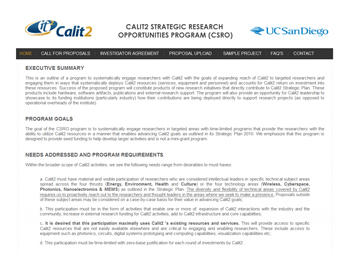UCSD Division of Calit2 Announces New Program to Support Campus Researchers
San Diego, January 18, 2010 --Faculty and other senior researchers at the University of California, San Diego will have a new campus source of potential funding for their research. The UCSD division of the California Institute for Telecommunications and Information Technology (Calit2) has launched the Calit2 Strategic Research Opportunities (CSRO) program, along with its first call for proposals that are due no later than February 15, 2010.
|
All funds for the new program will come from gifts and donations from corporations, family foundations and other business or philanthropic institutions. “Calit2 is very fortunate to get support from our industry partners and other private donors,” said Ramesh Rao, director of the UCSD division of Calit2, and a professor in the Electrical and Computer Engineering department of UCSD’s Jacobs School of Engineering. “We will use a collection of gift funds received by the institute to underwrite the CSRO program – offering UCSD faculty a new source of potential support for their research.”
The program will be open to all UCSD faculty members (and other senior UCSD researchers who are eligible to serve as independent principal investigators on extramural awards) if they are affiliated – or want to be affiliated – with Calit2. Researchers who are not already involved with Calit2 can submit an online form to become an academic participant.
“As Calit2 approaches its tenth anniversary next December, we are reaching out to the broader community of researchers, many of whom may not have been on campus in the formative years of the institute,” said Rajesh Gupta, associate director of Calit2 at UC San Diego and a professor in the Jacobs School’s Computer Science and Engineering department. “The CSRO program will hopefully attract the interest of faculty who share our vision and research agenda, and who will be able to leverage this support into larger, long-term activities in some key areas.”
In its 2010 Strategic Plan, the institute is targeting four major application thrusts: energy, the environment, health and culture. In addition, Calit2 foresees continued investment in enabling technologies, notably in wireless, photonics, cyberspace, as well as nanoelectronics and micro-electro-mechanical systems (MEMS).
“We want to engage researchers systematically with Calit2 to undertake projects that will be consistent with the institute’s strategic vision,” said Calit2 associate director William Hodgkiss, a professor in the Scripps Institution of Oceanography . “Calit2 has invested heavily in personnel, equipment and services, and this new program will allow us to match those resources with new research initiatives that can produce hardware, software, publications and external research support, especially in the thrust areas that will drive Calit2 in the next decade.”
The CSRO program and Calit2’s reputation as a hotbed of interdisciplinary innovation are expected to attract new faculty, who will join over 150 UCSD faculty members who are already affiliated with the institute.
All proposals will be judged on four technical criteria: scientific and technical merits; cost realism against the proposed effort; use of existing Calit2 infrastructure or the project’s potential to contribute to that infrastructure; and the likelihood of achieving pre-identified measures of success.
Proposed projects under the program are not required to be multidisciplinary, but interdisciplinary projects spanning different technical areas or engaging researchers drawn from different departments or schools will receive preference.
According to Gupta, CSRO is not a mini-grant program. Rather, the program is designed to provide seed funding to enable the expansion of Calit2 interactions with industry and the community, increase external research funding, and add to Calit2 infrastructure and core capabilities at UC San Diego.
Related Links
Calit2 Strategic Research Opportunities
Media Contacts
Doug Ramsey, 858-822-5825, dramsey@ucsd.edu

